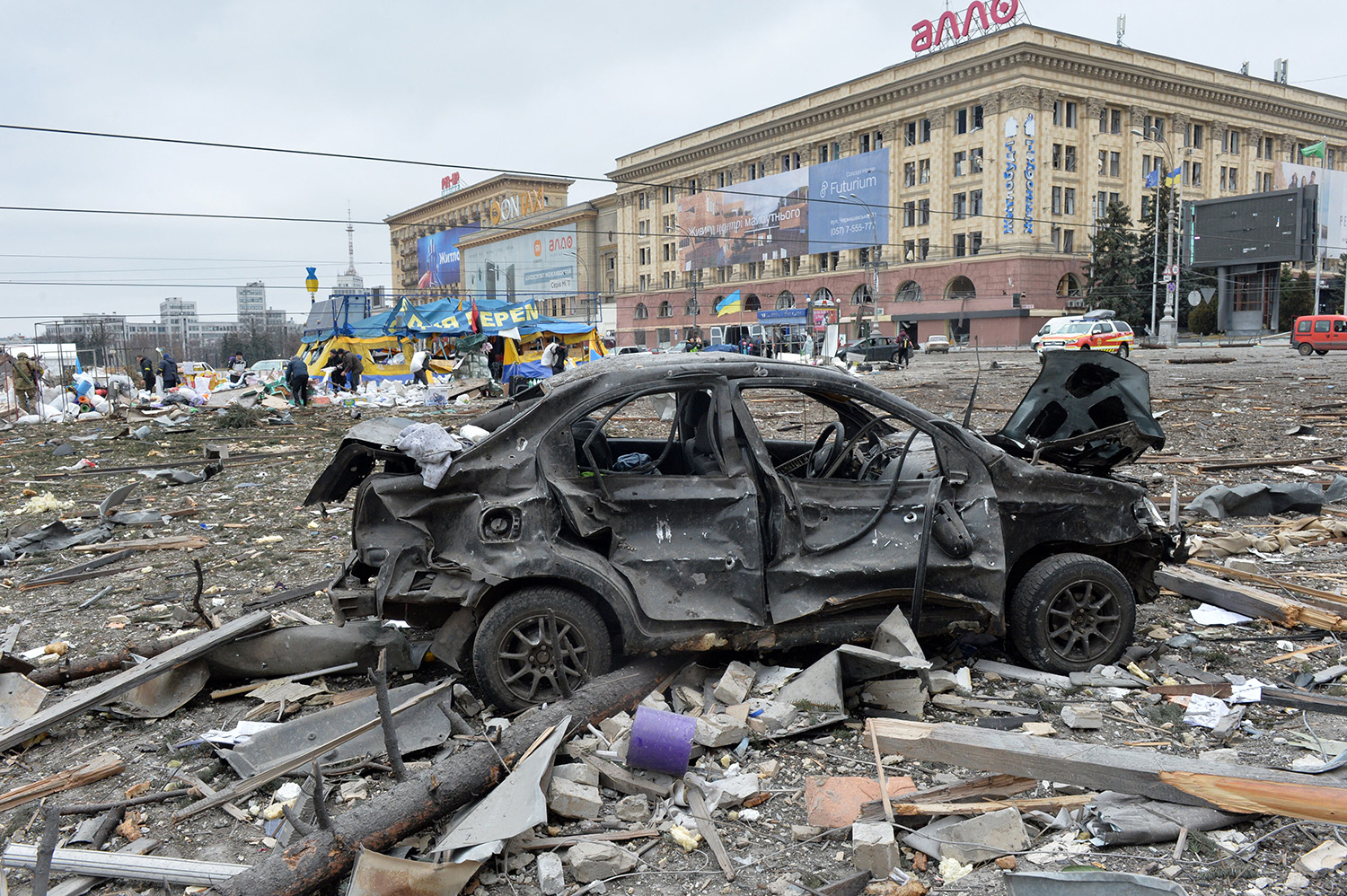Russian armed forces reportedly shelled Ukraine’s second-largest city Kharkiv with Grad and Smerch multiple launch rocket systems.
On Tuesday, Russian troops hit the local government office in the city center, killing ten civilians and wounding 20 others, according to Ukraine’s national emergency service.
Video footage from Kharkiv’s central Freedom Square showed a missile landing just outside the local government’s headquarters at 8:01 a.m. local time, causing a massive fireball and blowing out windows of surrounding buildings. Freedom Square is the second-largest city-center square in Europe and a landmark of the city.
“A missile targeting the central square of a city is open, undisguised terrorism,” Ukraine’s President Volodymyr Zelensky said in his message to Ukrainians, which called on the world community “to declare that Russia is committing state terrorism” for what he described as “a criminal tactic of the aggressor.”
Later in the day, additional Russian airstrikes hit residential neighborhoods in the densely populated city, killing eight more civilians, local authorities said.
Kharkiv has been shelled heavily for days and 16 people, including one woman, were killed before Tuesday's attack, according to the Kharkiv City Council. Artillery and rocket fire from Russian positions intensified since Monday, overshadowing the first direct talks between Ukrainian and Russian officials that failed to reach a ceasefire deal. The second round of talks between the parties is scheduled for Wednesday night.
Ukraine’s foreign minister Dmytro Kuleba tweeted a video of a huge explosion in Kharkiv’s Freedom Square, calling it a “barbaric missile strike” resulting from Moscow’s inability to “break Ukraine down.”
It has been seven days since Russian President Vladimir Putin launched an all-out offensive in Ukraine, claiming that the assault was aimed to protect the people of two self-proclaimed separatist-controlled regions of Ukraine allegedly being attacked by the Ukrainian military. Yet, the Russian advance has made slower progress than most military analysts had expected, mostly due to fierce Ukrainian resistance.
Russian forces escalated their attacks on major cities this week. Along with Kharkiv, Russian forces are reportedly shelling Ukraine’s capital city Kyiv. On Tuesday afternoon, a Russian airstrike hit Kyiv’s main television tower in the heart of the Ukrainian capital, putting several state media broadcasting off air. The attack claimed lives of five people and damaged a nearby memorial to the victims of the Nazi Holocaust.
Meanwhile, the southern city of Kherson, which has a population of some 300,000 people, is reportedly surrounded, and Mariupol, a port city also in the south of Ukraine, is without electricity after an intense bombardment.
As of February 28, Russia had fired more than 350 missiles at Ukrainian targets, including homes and civilian infrastructure, according to a US Department of Defense official.
Following clashes, Russian forces have seized control of the decommissioned Chernobyl nuclear plant and surrounding exclusion zone in northernmost Ukraine, close to the Belarusian border and just 132 kilometers from Kyiv. Russian troops also captured Berdyansk, a port city on the Sea of Azov.
Since the invasion began last Thursday, more than 2,000 Ukrainian civilians have been killed, Ukraine’s State Emergency Service said Wednesday. Russia has acknowledged for the first time that it has suffered losses.
Around 660,000 people have fled Ukraine since the start of Russia's invasion, according to the latest data compiled by UNHCR, the UN Refugee Agency.
Ukraine and Russia, the two post-Soviet countries, have been at odds since the 2014 crisis in Ukraine’s southern and eastern regions. Ukraine accuses Russia of annexing the Crimean Peninsula – a territory that extends into the Black Sea – and backing anti-government separatist regimes in the country’s eastern regions of Donetsk and Lugansk. Since then the crisis has destabilized the Donetsk and Lugansk regions – collectively known as Donbas. Kyiv and the West have accused Russia of supporting the separatist regimes in Donetsk and Lugansk with weapons and troops.







 Armenian sappers commenced on Monday mine-clearance operations in the territories adjacent to the Saint Mary Church in village of Voskepar (Armenia...
Armenian sappers commenced on Monday mine-clearance operations in the territories adjacent to the Saint Mary Church in village of Voskepar (Armenia...
 Iran and Pakistan have signed eight cooperation documents in various fields, and agreed to strengthen ties to fight terrorism in the region.
Iran and Pakistan have signed eight cooperation documents in various fields, and agreed to strengthen ties to fight terrorism in the region.
 President Aliyev emphasized the critical role of the North-South Transport Corridor in fostering transport cooperation between Azerbaijan and Russi...
President Aliyev emphasized the critical role of the North-South Transport Corridor in fostering transport cooperation between Azerbaijan and Russi...



